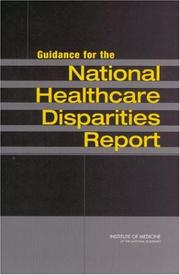| Listing 1 - 10 of 10 |
Sort by
|

ISBN: 076196083X 0761960848 1446235548 1283881497 1446265528 9781446235546 9781283881494 9780761960836 9781446265529 Year: 1999 Publisher: London ; Thousand Oaks : Sage,
Abstract | Keywords | Export | Availability | Bookmark
 Loading...
Loading...Choose an application
- Reference Manager
- EndNote
- RefWorks (Direct export to RefWorks)
Social Evidence and Health Needs is a practical, easy to use introduction to the main social research techniques used to gather evidence about the health needs of local communities.
Sociology of health --- Methods in social research (general) --- Health surveys. --- Health planning. --- Medical care --- Santé publique --- Soins médicaux --- Needs assessment. --- Enquêtes --- Planification --- Analyse des besoins --- Santé publique --- Soins médicaux --- Enquêtes --- Assessment of medical care needs --- Health care need --- Health care needs --- Health services needs --- Health planning --- Needs assessment --- Comprehensive health planning --- Health care planning --- Health services planning --- Medical care planning --- Public health --- Medical policy --- Planning --- Health services administration --- Public health surveys --- Surveys

ISBN: 1405102209 9781405102209 Year: 2005 Publisher: Oxford Blackwell
Abstract | Keywords | Export | Availability | Bookmark
 Loading...
Loading...Choose an application
- Reference Manager
- EndNote
- RefWorks (Direct export to RefWorks)
Medical care --- People with disabilities --- People with mental disabilities --- Intellectually disabled persons --- Mental disabilities, People with --- Mentally deficient persons --- Mentally disabled persons --- Mentally disordered persons --- Mentally handicapped --- Mentally retarded persons --- People with intellectual disabilities --- Retarded persons --- Intellectual disability --- Mentally ill --- Assessment of function of people with disabilities --- Functional assessment of people with disabilities --- Function tests (Medicine) --- Medical rehabilitation --- Psychological tests --- Assessment of medical care needs --- Health care need --- Health care needs --- Health services needs --- Health planning --- Needs assessment --- Functional assessment --- Psychological testing --- Assessment of function
Book
ISBN: 9789279148545 Year: 2010 Publisher: Luxemburg Publications Office
Abstract | Keywords | Export | Availability | Bookmark
 Loading...
Loading...Choose an application
- Reference Manager
- EndNote
- RefWorks (Direct export to RefWorks)
sociaal beleid --- gender --- gezondheidszorg --- Sociology of health --- Sociology of the family. Sociology of sexuality --- European Union --- Access to health care --- Accessibility of health services --- Accessibilité aux services de santé --- Availability of health services --- Gezondheidsdiensten--Toegankelijkheid --- Gezondheidszorg -- Behoeften --- Health Services Needs and Demand --- Health care needs --- Health services accessibility --- Medical care -- Needs --- Medical care--Access --- Services de santé [Accessibilité aux ] --- Soins medicaux -- besoins --- Toegankelijkheid van de gezondheidsdiensten --- Gezondheidszorg 61 --- Vrouwenproblematiek 396 --- 672 Gezondheidszorg. Behandeling --- 657 Vrouwenemancipatie --- EEC / European Union - EU -Europese Unie - Union Européenne - UE --- 351.2 --- 313 --- 311.6 --- 311.95 --- Openbare gezondheid. Milieubescherming. Milieuvervuiling. --- Levenswijze en levensstandaard. Levensminimum. sociale indicatoren (Studiën). --- Gezondheidstoestand van de bevolking. --- Bevolking naar het geslacht. --- E-books --- Europe --- Openbare gezondheid. Milieubescherming. Milieuvervuiling --- Levenswijze en levensstandaard. Levensminimum. sociale indicatoren (Studiën) --- Gezondheidstoestand van de bevolking --- Bevolking naar het geslacht
Book
ISBN: 9789241563703 Year: 2008 Publisher: Geneva World Health Organization
Abstract | Keywords | Export | Availability | Bookmark
 Loading...
Loading...Choose an application
- Reference Manager
- EndNote
- RefWorks (Direct export to RefWorks)
Gezondheidszorg--Oordeelkundig gebruik --- Health care rationing --- Health resources rationing --- Medical care rationing --- Rationing of health care --- Rationing of medical care --- Soins de santé--Usage rationnel --- Health care rationing. --- Medical care --- Medical care, Cost of. --- Social medicine. --- World health. --- Needs assessment. --- Medical care, Cost of --- Social medicine --- World health --- Assessment of medical care needs --- Health care need --- Health care needs --- Health services needs --- Health planning --- Needs assessment --- Cost of medical care --- Health care costs --- Health care expenditures --- Medical costs --- Medical expenses --- Medical service, Cost of --- Medicine --- Medical economics --- Medical savings accounts --- Medical policy --- Rationing --- Global health --- International health --- Public health --- Medical geography --- Medical sociology --- Medicine, Social --- Public welfare --- Sociology --- Medical ethics --- Medical sociologists --- Costs --- International cooperation --- Social aspects
Book
ISBN: 148998786X 1441971351 9786613086983 144197136X 1283086980 Year: 2011 Publisher: New York : Springer,
Abstract | Keywords | Export | Availability | Bookmark
 Loading...
Loading...Choose an application
- Reference Manager
- EndNote
- RefWorks (Direct export to RefWorks)
Building upon the success of Dr. Williams's widely influential book Eliminating Healthcare Disparities in America: Beyond the IOM Report, this new volume takes a fresh and timely look at the state of healthcare reform and the progress and problems we face in the pursuit of healthcare equality. This book focuses on how the elimination of disparities can be accomplished through targeted efforts made within the context of reform. Comprising the combined efforts of the nation's best health policy analysts, researchers, key opinion leaders and clinicians, this book addresses both current and impending legislation and future movements in healthcare. With the knowledge that the problem of disparities extends beyond the present political arena into the larger scope of all aspects of healthcare delivery, the authors provide critical analysis of the causation of disparities, insightful examples of what has worked, and a striking call to action with implementable strategies for advancing equality.
Equality -- Health aspects -- United States. --- Health care reform -- United States. --- Health services accessibility -- United States. --- Medical care -- Needs assessment -- United States. --- Medical policy -- Social aspects -- United States. --- Health services accessibility --- Equality --- Medical policy --- Medical care --- Health care reform --- Delivery of Health Care --- Public Policy --- Health Planning --- North America --- Patient Care Management --- Americas --- Health Care Economics and Organizations --- Health Care Quality, Access, and Evaluation --- Social Control Policies --- Social Control, Formal --- Health Services Administration --- Policy --- Health Care --- Geographic Locations --- Sociology --- Social Sciences --- Geographicals --- Anthropology, Education, Sociology and Social Phenomena --- Health Policy --- Health Care Reform --- Healthcare Disparities --- United States --- Public Health --- Health & Biological Sciences --- Social Medicine --- Health aspects --- Social aspects --- Needs assessment --- Medicine. --- Internal medicine. --- Medicine & Public Health. --- Medicine/Public Health, general. --- Internal Medicine. --- Medicine, Internal --- Medicine --- Clinical sciences --- Medical profession --- Human biology --- Life sciences --- Medical sciences --- Pathology --- Physicians --- Health Workforce

ISBN: 0309085195 9786610183258 128018325X 0309566290 9780309566292 9780309085199 0309169003 9780309169004 6610183252 Year: 2002 Publisher: Washington, D.C. : The National Academies Press,
Abstract | Keywords | Export | Availability | Bookmark
 Loading...
Loading...Choose an application
- Reference Manager
- EndNote
- RefWorks (Direct export to RefWorks)
Electronic books. -- local. --- Equality -- Health aspects -- United States. --- Health services accessibility -- United States. --- Medical care -- Needs assessment -- United States. --- Medical policy -- Social aspects -- United States. --- Health services accessibility --- Equality --- Medical policy --- Medical care --- Patient Care Management --- Health Care Quality, Access, and Evaluation --- Health --- Sociology --- Health Services Administration --- Population Characteristics --- Environment and Public Health --- Medicine --- North America --- Health Occupations --- Social Sciences --- Health Care --- Americas --- Anthropology, Education, Sociology and Social Phenomena --- Disciplines and Occupations --- Geographic Locations --- Geographicals --- Public Health --- Minority Groups --- Quality of Health Care --- United States --- Delivery of Health Care --- Socioeconomic Factors --- Health & Biological Sciences --- Social Medicine --- Health aspects --- Social aspects --- Needs assessment --- Health care policy --- Health policy --- Medicine and state --- Policy, Medical --- Public health --- Public health policy --- State and medicine --- Egalitarianism --- Inequality --- Social equality --- Social inequality --- Government policy --- Science and state --- Social policy --- Political science --- Democracy --- Liberty
Book
ISBN: 2873740302 2762118611 9782873740306 9782762118612 Year: 1995 Volume: 4 Publisher: Namur [Belgique]: Montréal: Artel/Fides,
Abstract | Keywords | Export | Availability | Bookmark
 Loading...
Loading...Choose an application
- Reference Manager
- EndNote
- RefWorks (Direct export to RefWorks)
Le vieillissement démographique impose un défi à l'institution contemporaine de la santé. Force est de constater l'insuffisance à le relever des approches strictement médicale et strictement économique. Le choix de la prise en charge adéquate, tant individuelle que collective, de la santé de chacun, et notamment des plus anciens d'entre nous, exige donc la médiation de la réflexion éthique
Social ethics --- Assistance sociale --- Bejaarden --- Ethique philosophique --- Gezondheidszorg --- Maatschappelijk werk --- Personnes âgées --- Soins de santé --- Wijsgerige ethiek --- Older people --- Bioethics --- Medical care --- Bioéthique --- Soins médicaux --- Health and hygiene --- Social aspects --- Santé et hygiène --- Aspect social --- Veroudering van de bevolking --- Medische ethiek --- Gezondheidseconomie --- #GBIB:CBMER --- 174.2 --- 351.77 --- 614.253 --- volksgezondheid --- vergrijzing (veroudering van de bevolking) --- gezondheidseconomie (gezondheidszorgeconomie) --- ethiek (ethische aspecten) --- rechtvaardigheid (rechtvaardigheidsprincipe, distributieve rechtvaardigheid) --- Vieillissement de la population --- Ethique médicale --- Economie de la santé --- santé publique --- viellissement de la population (viellissement démographique) --- économie de la santé (économie des soins de santé) --- ethique (aspects ethiques) --- justice (principe de justice, justice distributive, justice sociale) --- Medical ethics --- Health care rationing --- Medical economics --- Éthique médicale --- Économie de la santé --- Needs assessment --- Analyse des besoins --- Rationnement --- Social medicine. --- Personnes âgées --- Bioéthique --- Soins médicaux --- Santé et hygiène --- Care --- Finance --- France --- Public health --- Economic aspects --- Moral and ethical aspects --- Bioethics. --- Public health. --- Old age assistance. --- Health and hygiene. --- Older people - Medical care --- Medical care - Needs assessment --- Personnes âgées - Soins médicaux --- Soins médicaux - Analyse des besoins --- Soins médicaux - Rationnement --- Aged --- Ethics, medical

ISBN: 1280333103 0203020332 1134854390 9786610333103 9780203020333 6610333106 9780415101110 0415101115 9780415101127 0415101123 0415101123 0415101115 9781134854349 9781134854387 9781134854394 1134854382 Year: 1996 Publisher: London ; New York : Routledge,
Abstract | Keywords | Export | Availability | Bookmark
 Loading...
Loading...Choose an application
- Reference Manager
- EndNote
- RefWorks (Direct export to RefWorks)
The rhetoric of 'needs' has been used to legitimate all major turns in UK health policy since 1936. This study identifies the ethical, policy and technical issues arising from the concept of needs. In the first part a theory of needs is developed, which takes into account both the philosophical traditions and the practical problems arising in daily health care. In a second part, health systems throughout the world are described and compared, addressing ethical as well as economical questions. Its interdisciplinary approach will make The Need for Healthcare important reading not on
Medical policy --- Medical care --- Need (Philosophy) --- Right to health --- Health Services Needs and Demand. --- Health Policy. --- Human Rights. --- Health care policy --- Health policy --- Medicine and state --- Policy, Medical --- Public health --- Public health policy --- State and medicine --- Science and state --- Social policy --- Health care, Right to --- Health, Right to --- Medical care, Right to --- Right to health care --- Right to medical care --- Social rights --- Philosophy --- Assessment of medical care needs --- Health care need --- Health care needs --- Health services needs --- Health planning --- Needs assessment --- Collective Human Rights --- Equal Rights --- Linguistic Rights --- Right to Housing and Shelter --- Rights of Indigenous Peoples --- Human Rights, Collective --- Indigenous Peoples Rights --- Rights, Collective Human --- Rights, Equal --- Rights, Linguistic --- Social Justice --- Human Rights Abuses --- Healthcare Policy --- National Health Policy --- Health Policies --- Health Policy, National --- Healthcare Policies --- National Health Policies --- Policy, Health --- Policy, Healthcare --- Policy, National Health --- Policy Making --- Health Services Needs --- Needs --- Needs and Demand, Health Services --- Target Population --- Health Services Need --- Need, Health Services --- Needs, Health Services --- Population, Target --- Populations, Target --- Target Populations --- Health Care Sector --- Moral and ethical aspects --- Government policy --- National Health Service. --- United Kingdom. --- Great Britain --- Isle of Man --- Great Britain. --- National Health Service (Great Britain) --- NHS --- NHS Executive --- Health Care Policies --- Care Policies, Health --- Health Care Policy --- Policies, Health --- Policies, Health Care --- Policies, Healthcare --- Policy, Health Care --- Right to health. --- Medical policy. --- Needs assessment.
Book
ISBN: 1784411965 9781784411961 1784411973 1322294771 9781784411978 Year: 2014 Publisher: West Yorkshire, England : Emerald,
Abstract | Keywords | Export | Availability | Bookmark
 Loading...
Loading...Choose an application
- Reference Manager
- EndNote
- RefWorks (Direct export to RefWorks)
The mission of healthcare organizations has undergone a remarkable transformation from curing disease to caring for the well-being of populations. While health care policy has explored this domain before, notably in Health Maintenance Organizations, the current efforts to create Patient-Centered Medical Homes (PCMHs) and Accountable Care Organizations (ACOs) represent a broader effort to move organizational responsibilities towards population health and care management. Volume 16 of AHCM presents papers that explore this topic across various levels of the healthcare system and employing multiple research designs including case studies, theoretical pieces, secondary data analyses, survey research and qualitative methodologies. Aspects of health care organization discussed in this volume include the PCMH, ACOs, integration with the public health and mental health systems, hospital-physician alignment, and resource planning. Population health management is presented as a factor driving these organizational changes and as a mechanism to facilitate this change.
Health services administration --- Public health. --- Community health --- Health services --- Hygiene, Public --- Hygiene, Social --- Public health services --- Public hygiene --- Social hygiene --- Health --- Human services --- Biosecurity --- Health literacy --- Medicine, Preventive --- National health services --- Sanitation --- Public health administration --- Health facilities --- Health promotion --- Disease management --- Delivery of Health Care --- Health Services Administration --- Health Promotion --- Disease Management --- organization & administration --- methods --- E-books --- Disease Managements --- Management, Disease --- Managements, Disease --- Promotional Items --- Health Campaigns --- Promotion of Health --- Wellness Programs --- Campaign, Health --- Campaigns, Health --- Health Campaign --- Health Promotions --- Item, Promotional --- Items, Promotional --- Program, Wellness --- Programs, Wellness --- Promotion, Health --- Promotional Item --- Promotions, Health --- Wellness Program --- Health Education --- Preventive Health Services --- Preventive Medicine --- Administration, Health Services --- Health Services --- Community-Based Distribution --- Contraceptive Distribution --- Delivery of Healthcare --- Dental Care Delivery --- Distribution, Non-Clinical --- Distribution, Nonclinical --- Distributional Activities --- Healthcare --- Healthcare Delivery --- Healthcare Systems --- Non-Clinical Distribution --- Nonclinical Distribution --- Delivery of Dental Care --- Health Care --- Health Care Delivery --- Health Care Systems --- Activities, Distributional --- Activity, Distributional --- Care, Health --- Community Based Distribution --- Community-Based Distributions --- Contraceptive Distributions --- Deliveries, Healthcare --- Delivery, Dental Care --- Delivery, Health Care --- Delivery, Healthcare --- Distribution, Community-Based --- Distribution, Contraceptive --- Distribution, Non Clinical --- Distributional Activity --- Distributions, Community-Based --- Distributions, Contraceptive --- Distributions, Non-Clinical --- Distributions, Nonclinical --- Health Care System --- Healthcare Deliveries --- Healthcare System --- Non Clinical Distribution --- Non-Clinical Distributions --- Nonclinical Distributions --- System, Health Care --- System, Healthcare --- Systems, Health Care --- Systems, Healthcare --- Clinical medicine --- Medical care --- Decision making --- Cost control --- Medical --- Business & Economics --- Health systems & services. --- Medical administration & management. --- Managed care plans (Medical care) --- Health services accessibility. --- Health Care Delivery. --- Management. --- Management Science. --- Patients --- Care. --- Needs assessment. --- Access to health care --- Accessibility of health services --- Availability of health services --- Assessment of medical care needs --- Health care need --- Health care needs --- Health services needs --- Health planning --- Needs assessment --- Managed care programs (Medical care) --- Managed care systems (Medical care) --- Managed health care --- Plans, Managed care (Medical care) --- Programs, Managed care (Medical care) --- Systems, Managed care (Medical care) --- Health insurance --- Access
Book

ISBN: 9241547707 9240687211 Year: 2009 Publisher: Geneva : World Health Organization,
Abstract | Keywords | Export | Availability | Bookmark
 Loading...
Loading...Choose an application
- Reference Manager
- EndNote
- RefWorks (Direct export to RefWorks)
In many countries shortage and maldistribution of trained health workers is one of the most important constraints to strengthening the delivery of primary and other health services including curative promotional preventive and rehabilitative services. At the same time many countries currently lack the technical capacity to accurately monitor their own health workforce: data are often unreliable and out-of-date common definitions and proven analytical tools are absent skills and experience for assessing crucial policy issues are lacking. This Handbook aims to strengthen that technical capacity.
Developing Countries. --- Health Manpower -- organization & administration. --- Health Personnel -- organization & administration. --- Health Personnel -- statistics & numerical data. --- Medical care -- Needs assessment. --- Personnel Management. --- Public health administration. --- Public health personnel. --- World health. --- Medical personnel --- Qualitative research --- Health Care Facilities, Manpower, and Services --- International Cooperation --- Organization and Administration --- Occupational Groups --- Health Resources --- Delivery of Health Care --- Health Services Administration --- Health Care --- Internationality --- Persons --- Named Groups --- Health Care Quality, Access, and Evaluation --- Social Sciences --- Anthropology, Education, Sociology and Social Phenomena --- Health Personnel --- Personnel Management --- Health Manpower --- Developing Countries --- Developing Nations --- Least Developed Countries --- Less-Developed Nations --- Third-World Nations --- Under-Developed Nations --- Less-Developed Countries --- Third-World Countries --- Under-Developed Countries --- Countries, Developing --- Countries, Least Developed --- Countries, Less-Developed --- Countries, Third-World --- Countries, Under-Developed --- Country, Developing --- Country, Least Developed --- Country, Less-Developed --- Country, Third-World --- Country, Under-Developed --- Developed Countries, Least --- Developed Country, Least --- Developing Country --- Developing Nation --- Least Developed Country --- Less Developed Countries --- Less Developed Nations --- Less-Developed Country --- Less-Developed Nation --- Nation, Less-Developed --- Nation, Third-World --- Nation, Under-Developed --- Nations, Developing --- Nations, Less-Developed --- Nations, Third-World --- Nations, Under-Developed --- Third World Countries --- Third World Nations --- Third-World Country --- Third-World Nation --- Under Developed Countries --- Under Developed Nations --- Under-Developed Country --- Under-Developed Nation --- Health Workforce --- Manpower, Health --- Manpower, Health Occupations --- Health Occupations Manpower --- Workforce, Health --- Health --- Health Occupations --- Medicine --- Client-Staff Ratio --- Client Staff Ratio --- Client-Staff Ratios --- Management, Personnel --- Ratio, Client-Staff --- Ratios, Client-Staff --- Field Workers --- Fieldworkers --- Healthcare Providers --- Health Care Providers --- Field Worker --- Fieldworker --- Health Care Provider --- Healthcare Provider --- Personnel, Health --- Provider, Health Care --- Provider, Healthcare --- Providers, Health Care --- Providers, Healthcare --- Worker, Field --- Workers, Field --- Science, Social --- Sciences, Social --- Social Science --- Healthcare Quality, Access, and Evaluation --- Person --- Globalization --- International Aspects --- International Perspectives --- International Relations --- Multinational Aspects --- Multinational Perspectives --- Aspect, International --- Aspect, Multinational --- Aspects, International --- Aspects, Multinational --- International Aspect --- International Perspective --- Multinational Aspect --- Multinational Perspective --- Perspective, International --- Perspective, Multinational --- Perspectives, International --- Perspectives, Multinational --- Relations, International --- Community-Based Distribution --- Contraceptive Distribution --- Delivery of Healthcare --- Dental Care Delivery --- Distribution, Non-Clinical --- Distribution, Nonclinical --- Distributional Activities --- Healthcare --- Healthcare Delivery --- Healthcare Systems --- Non-Clinical Distribution --- Nonclinical Distribution --- Delivery of Dental Care --- Health Care Delivery --- Health Care Systems --- Activities, Distributional --- Activity, Distributional --- Care, Health --- Community Based Distribution --- Community-Based Distributions --- Contraceptive Distributions --- Deliveries, Healthcare --- Delivery, Dental Care --- Delivery, Health Care --- Delivery, Healthcare --- Distribution, Community-Based --- Distribution, Contraceptive --- Distribution, Non Clinical --- Distributional Activity --- Distributions, Community-Based --- Distributions, Contraceptive --- Distributions, Non-Clinical --- Distributions, Nonclinical --- Health Care System --- Healthcare Deliveries --- Healthcare System --- Non Clinical Distribution --- Non-Clinical Distributions --- Nonclinical Distributions --- System, Health Care --- System, Healthcare --- Systems, Health Care --- Systems, Healthcare --- Administration, Health Services --- Health Services --- Resources --- Health Resource --- Resource --- Resource, Health --- Resources, Health --- Group, Occupational --- Groups, Occupational --- Occupational Group --- Administration and Organization --- Administrative Technics --- Administrative Techniques --- Coordination, Administrative --- Logistics --- Supervision --- Technics, Administrative --- Techniques, Administrative --- Administration --- Administrative Coordination --- Administrative Technic --- Administrative Technique --- Technic, Administrative --- Technique, Administrative --- Treaties --- Foreign Aid --- Aid, Foreign --- Cooperation, International --- Treaty --- Healthcare Facilities, Manpower, and Services --- Qualitative analysis (Research) --- Qualitative methods (Research) --- Health care personnel --- Health care professionals --- Health manpower --- Health personnel --- Health professions --- Health sciences personnel --- Health services personnel --- Healthcare professionals --- Medical manpower --- manpower --- supply & distribution --- organization & administration --- Healthcare Workers --- Healthcare Worker --- International Law --- Occupations --- Research --- Professional employees --- Employee --- Employees --- Personnel --- Worker --- Workers --- Health Care Professionals --- Health Care Professional --- Professional, Health Care --- Developing countries. --- Emerging nations --- Fourth World --- Global South --- LDC's --- Least developed countries --- Less developed countries --- Newly industrialized countries --- Newly industrializing countries --- NICs (Newly industrialized countries) --- Third World --- Underdeveloped areas --- Underdeveloped countries --- LMICs --- Low Income Countries --- Low and Middle Income Countries --- Lower-Middle-Income Country --- Middle Income Countries --- Countries, Middle Income --- Country, Low Income --- Country, Lower-Middle-Income --- Country, Middle Income --- Low Income Country --- Lower Middle Income Country --- Lower-Middle-Income Countries --- Middle Income Country --- Health Care Facilities Workforce and Services. --- Delivery of Health Care. --- Health Workforce.
| Listing 1 - 10 of 10 |
Sort by
|

 Search
Search Feedback
Feedback About UniCat
About UniCat  Help
Help News
News